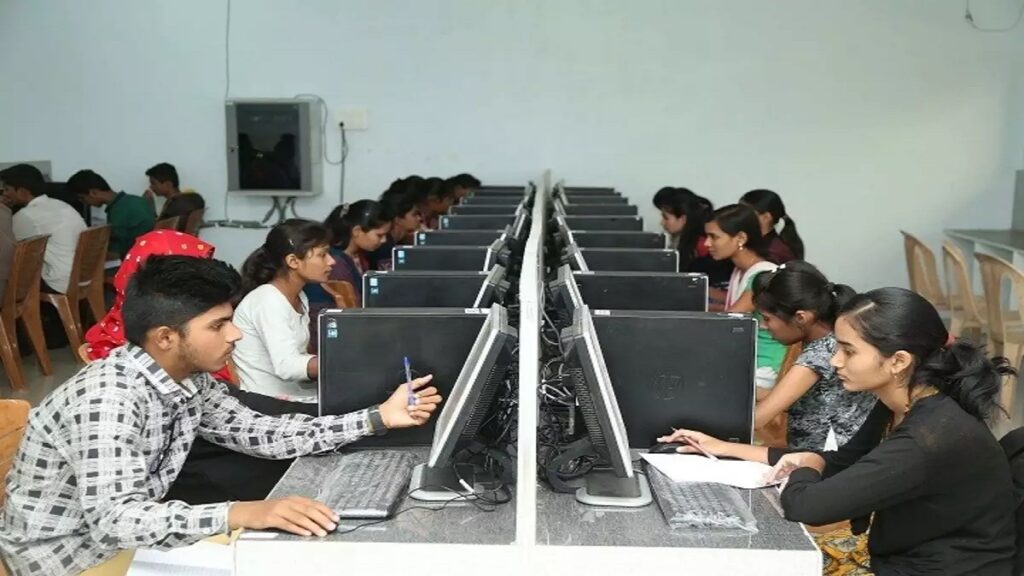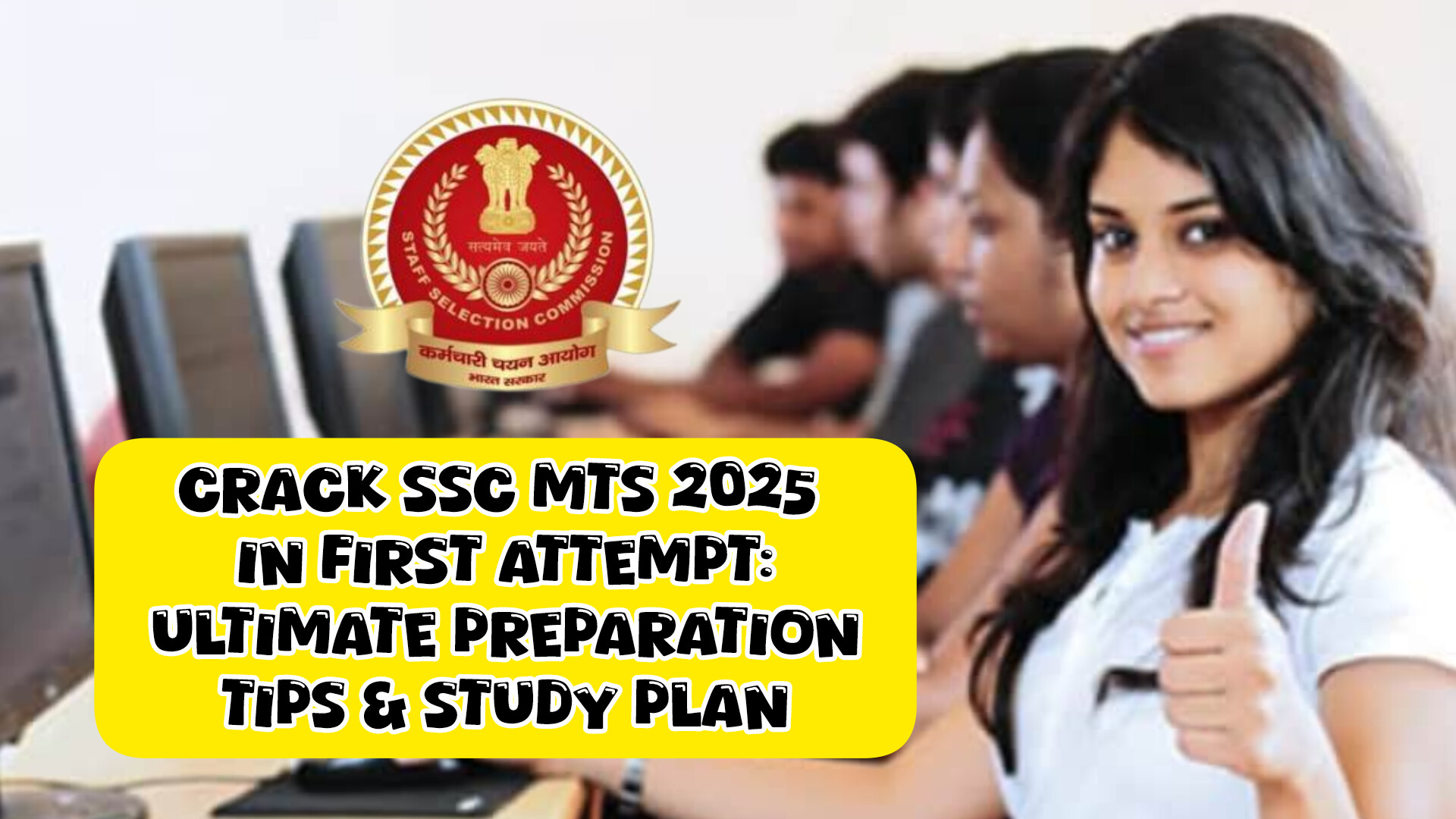Cracking the SSC MTS (Multi-Tasking Staff) exam requires a strategic approach, consistent effort, and effective time management. The exam, conducted by the Staff Selection Commission (SSC), tests candidates on General Intelligence & Reasoning, Numerical Aptitude, General English, and General Awareness through a Computer-Based Examination (CBE). Below is a comprehensive guide with preparation tips to help you excel in the SSC MTS 2025 exam, scheduled from September 20 to October 24, 2025.
Overview of SSC MTS Exam 2025
- Exam Structure: The SSC MTS exam consists of:
- Paper 1 (CBE): Objective-type test with two sessions:
- Session I: Numerical Ability (20 questions, 60 marks) and Reasoning Ability (20 questions, 60 marks). No negative marking.
- Session II: General Awareness (25 questions, 75 marks) and English Language (25 questions, 75 marks). Negative marking of 1 mark per wrong answer in Session II.
- Total: 90 questions, 270 marks, 90 minutes (45 minutes per session).
- Physical Efficiency Test (PET)/Physical Standard Test (PST): Applicable only for Havaldar posts.
- No Descriptive Test: As per the latest notification, there is no Tier 2 descriptive exam.
- Vacancies: 1075 Havaldar posts announced; MTS vacancies to be updated.
General Preparation Tips
- Understand the Exam Pattern and Syllabus:
- Familiarize yourself with the detailed syllabus and exam pattern available on the official SSC website (www.ssc.gov.in).
- Key topics include:
- Numerical Aptitude: Integers, LCM, HCF, Fractions, Percentages, Ratio, Averages, Profit and Loss, Simple Interest, Geometry, Data Interpretation.
- Reasoning: Analogies, Coding-Decoding, Series, Non-Verbal Reasoning, Seating Arrangements.
- English Language: Reading Comprehension, Error Spotting, Fill in the Blanks, Synonyms, Antonyms, Idioms, Grammar.
- General Awareness: Current Affairs, History, Geography, Economics, Polity, General Science, Static GK.
- Knowing the weightage and question types helps prioritize high-scoring topics.
- Create a Study Plan:
- Design a 60-day or 6-month study schedule based on your preparation timeline. Allocate 3–4 hours daily to cover all subjects.
- Divide time based on topic weightage and your strengths/weaknesses. For example:
- Numerical Aptitude and Reasoning: 1–1.5 hours daily.
- English: 1 hour daily.
- General Awareness: 1–1.5 hours daily (including current affairs).
- Include weekly revision and mock tests in your plan.
- Practice with Previous Year Papers and Mock Tests:
- Solve previous year’s question papers to understand question types and difficulty levels.
- Take regular mock tests to simulate exam conditions, improve speed, and identify weak areas. Free mock tests are available on platforms like Testbook or PracticeMock.
- Analyze your performance after each test to avoid repeating mistakes.
- Time Management:
- Practice solving questions within the allotted time (45 minutes per session). Aim to answer easier questions first to maximize scores.
- Develop shortcuts for Quantitative Aptitude and Reasoning to save time.
- Avoid spending too much time on a single question; skip and return if needed.
- Use Quality Study Materials:
- Refer to recommended books:
- English: Objective General English by S.P. Bakshi, Word Power Made Easy by Norman Lewis.
- Quantitative Aptitude: Quantitative Aptitude by R.S. Aggarwal, Fast Track Objective Arithmetic by Rajesh Verma.
- Reasoning: A Modern Approach to Verbal & Non-Verbal Reasoning by R.S. Aggarwal.
- General Awareness: Lucent’s General Knowledge, Static General Awareness by AP Bhardwaj.
- Supplement with online resources like SSC’s official website, YouTube tutorials, or apps like Testbook.
- Stay Healthy and Stress-Free:
- Maintain a balanced routine with proper sleep, diet, and exercise to stay focused.
- Arrive at the exam center 30 minutes early to avoid last-minute stress.
- Practice relaxation techniques like meditation to stay calm during preparation and on exam day.
Subject-Wise Preparation Tips

1. General English
- Focus Areas: Vocabulary (synonyms, antonyms, idioms), Grammar (error spotting, sentence correction), Reading Comprehension, Fill in the Blanks.
- Tips:
- Read newspapers (e.g., The Hindu) daily to improve vocabulary and comprehension.
- Practice 10–15 new words daily and use them in sentences. Avoid cramming; use visual imagery to memorize idioms and phrases.
- Solve grammar exercises to master rules like tenses, prepositions, and subject-verb agreement.
- Practice reading comprehension passages to improve speed and accuracy. Aim to answer 25 questions in 7–10 minutes.
- Use the elimination method for multiple-choice questions to rule out incorrect options.
2. General Intelligence & Reasoning
- Focus Areas: Analogies, Coding-Decoding, Series, Non-Verbal Reasoning, Seating Arrangements, Blood Relations, Puzzles.
- Tips:
- Practice different question types daily, starting with time-consuming topics like puzzles and seating arrangements.
- Focus on non-verbal reasoning, as it often has a higher weightage.
- Develop logical thinking by solving questions in a time-bound manner to improve speed and accuracy.
- Use flowcharts or diagrams for complex problems like blood relations or seating arrangements.
- Aim to complete 20 questions in 15–20 minutes during practice.
3. Numerical Aptitude
- Focus Areas: Arithmetic (Percentages, Ratio, Averages), Algebra, Geometry, Data Interpretation, Simple Interest, Profit and Loss.
- Tips:
- Master basic concepts like LCM, HCF, fractions, and BODMAS to tackle complex questions.
- Learn shortcut tricks for calculations (e.g., percentage-to-fraction conversion, multiplication shortcuts).
- Practice data interpretation and average-based questions, as they are often easier and scoring.
- Memorize formulas and practice applying them to diverse problems.
- Solve 20 questions daily to build confidence and speed.
4. General Awareness
- Focus Areas: Current Affairs, Static GK (History, Geography, Polity/w Polity, Economics), General Science.
- Tips:
- Read newspapers (e.g., The Indian Express) and monthly current affairs magazines to stay updated.
- Focus on events from the last 6 months before the exam.
- Study static GK topics like Indian Constitution, important dates, and scientific discoveries using books like Lucent’s General Knowledge.
- Make concise notes or flashcards for quick revision of facts and figures.
- Practice 25–30 questions daily to cover the vast syllabus efficiently.
Tips for Havaldar Aspirants (PET/PST Preparation)
- Physical Efficiency Test (PET):
- Requirements: Walking (1600m for males in 15 minutes, 1 km for females in 20 minutes) and cycling (8 km for males in 30 minutes, 3 km for females in 25 minutes).
- Preparation: Practice daily walking and cycling to build endurance. Include warm-ups and stretches to avoid injuries.
- Physical Standard Test (PST):
- Ensure you meet height, chest (for males), and weight standards as per the notification. Maintain a healthy diet and exercise routine.
Exam Day Guidelines
- Carry: SSC MTS 2025 Admit Card, a valid photo ID (e.g., Aadhar, PAN), and a recent colored photograph.
- Dress Code: Wear comfortable, simple clothing as per SSC guidelines.
- Dos: Arrive early, follow instructions, and focus on easier questions first to maximize scores.
- Don’ts: Avoid carrying prohibited items (e.g., electronics) and refrain from guessing in Session II due to negative marking.
Additional Tips to Crack SSC MTS in First Attempt
- Focus on Accuracy: In Session II, prioritize accuracy over guessing to avoid negative marking.
- Revise Regularly: Use short notes or flashcards for quick revision, especially for General Awareness and formulas.
- Stay Updated: Check the SSC website for notifications and admit card release. The application correction window is July 29–31, 2025.
- Motivation: Stay positive and consistent. Regular practice and revision are key to retaining concepts.
Sample 60-Day Study Plan
| Week | Numerical Aptitude | Reasoning | English | General Awareness |
|---|---|---|---|---|
| 1–2 | Basics (LCM, HCF, Fractions) | Analogies, Series | Vocabulary, Grammar Rules | Static GK (History, Geography) |
| 3–4 | Percentages, Averages, Data Interpretation | Coding-Decoding, Puzzles | Reading Comprehension, Error Spotting | Current Affairs (Last 6 months) |
| 5–6 | Algebra, Geometry, Profit & Loss | Non-Verbal Reasoning, Seating Arrangements | Idioms, Fill in the Blanks | Polity, Economics, Science |
| 7–8 | Mock Tests, Revision | Mock Tests, Revision | Mock Tests, Revision | Mock Tests, Revision |
Key Resources
- Official Website: www.ssc.gov.in for syllabus, notifications, and admit cards.
- Mock Tests: PracticeMock, Testbook, or Oliveboard for free and paid test series.
- Previous Year Papers: Available on sites like CareerPower or Embibe.
By following this structured approach, practicing consistently, and staying updated with current affairs, you can crack the SSC MTS 2025 exam in your first attempt. Start early, stay disciplined, and good luck!

